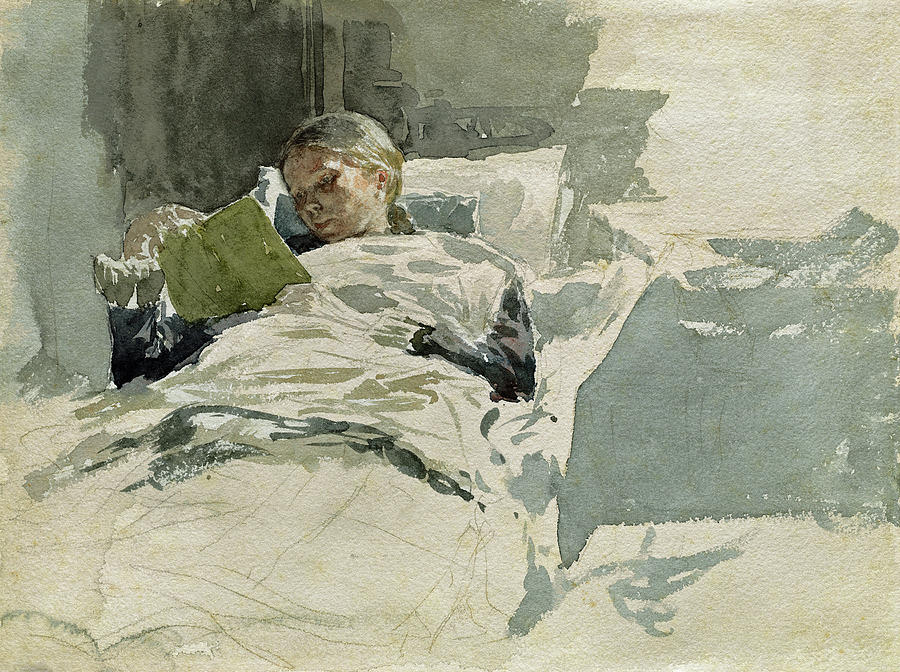Wednesday
Okay, this will be my last post about Ruth Ozeki’s The Book of Form and Emptiness. I’m in love with it because it knows me so well.
I relate deeply, for instance, to what it says about bedside reading. The passage occurs right after the character “Book” (the novel takes the form of a conversation between 15-year-old Benny and the book that is telling his story) informs us that, above all, books “dislike neglect”:
Picture, for a moment, your own bedside table. Imagine what it feels like to be the top book on your stack, occupying pride of place and enjoying your nightly attention. Sure, the days are long, but we look forward to the moment when you slip between the sheets, prop yourself up on the pillows, and turn on your reading lamp. That small soughing sound you hear as you open the covers and turn the page is a sign of relief. Then imagine our dismay when another volume comes along and tops us, often before you have even read our last page! Imagine the humiliation we feel as, book by book, we slip down to the bottom of your pile, knowing that we have failed to hold your attention and have been replaced, often by lighter, more “relatable” reads.
“More relatable,” Book goes on to explain, may mean turning from a challenging book to a formulaic genre:
Sadly, genre-ism is a form of bigotry, and one that is endemic in libraries and bookstores, any place where books gather.
To be sure, this dislike of formulaic fiction is its own kind of prejudice, as Book observes elsewhere:
Biases abound on library shelves. The scholarly tomes disparage the more commercial books. Literary novels look down on romance and pulp fiction, and there is an almost universal disregard for certain genres, like self-help.
Shifting gears, here’s another beautiful observation:
The first words of a book are of utmost importance. The moment of encounter, when a reader turns to that first page and reads those opening words, it’s like locking eyes or touching someone’s hand for the first time, and we feel it, too. Books don’t have eyes or hands, it’s true, but when a book and a reader are meant for each other, both of them know it…
I also like this one:
Strange things happen in Libraries, Benny. The Public Library is a shrine of dreams, and people fall in love here all the time. Maybe you don’t believe this, but it’s true. Books are works of love, after all. Our bodies may not be made to enjoy the mysteries of corporeal conjugation, but even our driest tomes, the most unromantic among us, can make your dreams come true.
Given my love affair with Slovenia, I perked up when I encountered a Slovenian émigré poet in Ozeki’s pages. An old bagman who must get around in a wheelchair, he serves as a mentor to the younger characters, dispensing such reflections as the following. Benny has just asked Slavoj why he invokes God if he doesn’t believe in God:
“God is a story,” he said. “I believe in stories, and God knows this. Stories are real, my boy. They matter. If you lose your belief in your story, you vill lose yourself.”
And:
“Ze truth about stories is that is all we are.” A famous Cherokee writer named Thomas King once said this. We are ze stories we tell ourselves, Benny-boy. We meck ourselves up. We meck each other up, too.
Here’s one last passage, this one referring to intertextuality. I like the vision of all the books we have read operating as a “rhizomatic network beneath human consciousness” that “knits the world of thought together”:
Is it odd to see a book within a book? It shouldn’t be. Books like each other. We understand each other. You could even say we are all related, enjoying a kinship that stretches like a rhizomatic network beneath human consciousness and knits the world of thought together. Think of us as a mycelium, a vast, subconscious fungal mat beneath a forest floor, and each book a fruiting body. Like mushrooms, we are a collectivity. Our pronouns are we, our, us.
Do yourself a favor and pick up a copy of Book of Form and Emptiness. You too may recognize yourself in its pages.


